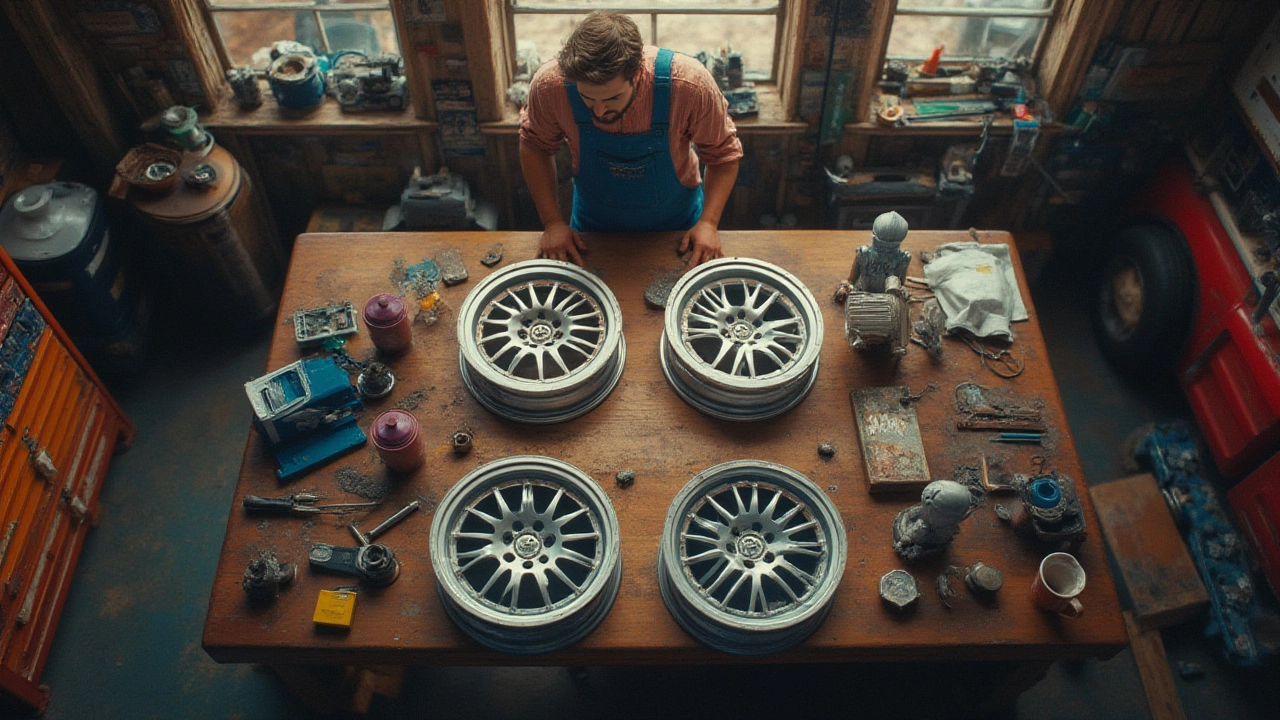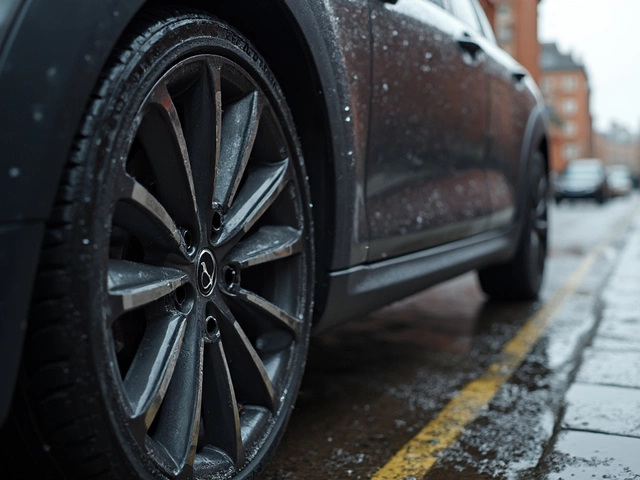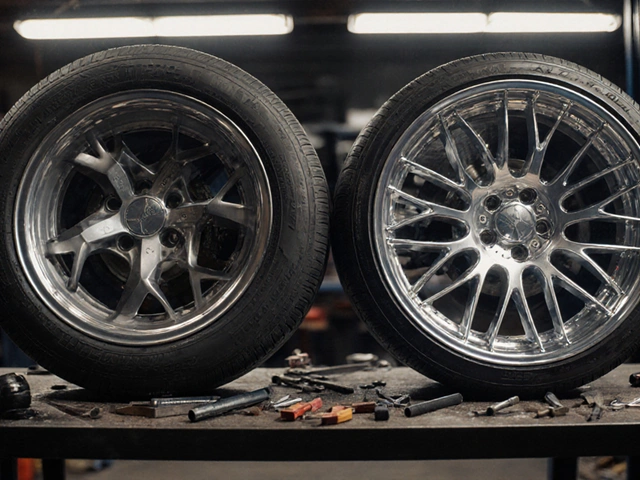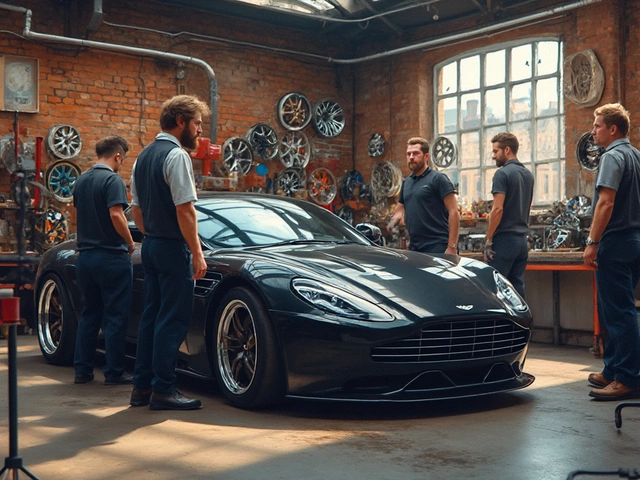Cruising through a Melbourne summer, you’ll spot all kinds of rides on the road. But here’s a little secret: the wheels you pick actually speak volumes about what you value—performance, style, or maybe just peace of mind on potholed streets. Take a closer look, and you’ll see a hot debate lurking among car lovers: aluminum wheels or alloy wheels? This isn’t just about looks, but how your car feels on the road, how much fuel you burn, and even how much you end up spending in the long haul. Let’s lift the bonnet (well, figuratively) and see which wheels might actually suit you best—no sales talk, just honest comparisons, so you can roll easy.
What Actually Sets Aluminum and Alloy Wheels Apart?
So right off the bat, let's clear up a common confusion: all aluminum wheels are technically a kind of alloy wheel, but not all alloy wheels are made from pure aluminum. It sounds circular, but it matters. The word "alloy" just means a blend of metals. When you hear "alloy wheels," it usually refers to a wheel made from a mix of aluminum and something else—often a bit of nickel, sometimes magnesium. These extras are meant to tweak strength, durability, or weight.
Let’s get specific. Pure aluminum wheels are pretty rare these days and tend to be soft and a bit on the heavy side. In fact, nearly every modern car brand, from Ford to Hyundai, opts for aluminum alloy wheels because they offer the best of both worlds. This combo results in a lighter, stronger wheel that's easier for manufacturing, painting, and showing off at car meets.
Why so much fuss over the materials? It’s all about how much abuse your wheels can handle. Back in the day, steel wheels were the go-to: tough as nails, but heavy. Aluminum alloys brought a revolution. They weighed less, which made cars more responsive and efficient. One interesting stat: swapping from steel to aluminum alloy wheels can shave between 3 to 5 kg (about 6.5 to 11 lbs) off each corner of your car. You wouldn’t think a few kilos matter, but drop the total weight of a family sedan by just 20 kg and you may see up to a 2% bump in fuel economy, not to mention a slight edge in acceleration and handling.
There's also the matter of design flexibility. Heat-treated aluminum alloys can be cast, forged, or machined into wild shapes and thinner spokes, letting companies like OZ Racing or Enkei drop jaws at auto expos. This is practically impossible with traditional steel or even pure, soft aluminum wheels.
So to sum up—if you’re after lightweight and stylish wheels built to handle Aussie potholes and urban scrapes, aluminum alloy is the industry’s pick. You can technically still find forged magnesium alloys or mixes with unique metals for racing or high-performance cars, but for the average person, you’re usually choosing between different aluminum alloy mixes rather than full-on pure aluminum versus alloy.

Performance, Durability, and Looks: How Do They Compete?
Ok, let's compare how these wheels perform on the car—whether you drive a 4WD ute down the Great Ocean Road or you’re just getting the kids to footy practice.
Aluminum wheels—let’s simplify here and just say the ones made mostly from aluminum—are known for being light. Lighter wheels mean less “unsprung mass,” which is what your suspension has to wrangle over every bump. This translates, in plain English, to a smoother ride and sharper handling, especially when you’re cornering hard. This is why you’ll see performance brands and sports cars boasting about their forged aluminum wheels in their spec sheets.
But there’s a trade-off. Aluminum isn’t as tough as steel, so even when mixed with other metals you might notice cracks or bends over years of hitting gutters or nasty road hazards. The good news is, for the average driver, modern aluminum alloys are still tough enough for regular use—unless you do rally events every weekend or regularly head off-road.
Now, let’s talk about what most people care about—looks. Aluminum alloy wheels win here by a mile. You’ve seen them: multi-spoke, split-spoke, diamond-cut finishes, and gunmetal greys that look killer under city lights. Because they’re easier to shape than steel, designers go wild. Ever seen an intricate mesh or turbine-style wheel? That's a product of aluminum alloy creativity.
Corrosion is another thing. Aluminum alloys resist rust because there’s no iron for water to gnaw on. Instead, they can suffer from oxidation—think dull, milky spots from harsh chemicals or salt (common in snowy or coastal areas). But wash your wheels every fortnight and you’ll be sweet. In fact, studies from car detailing pros in Melbourne found that a routine clean keeps alloy wheels looking fresh over a decade, even with regular beach trips.
If you’re feeling geeky, check this out. Here’s a real-life table comparing the most common features between aluminum (alloy) and steel wheels based on manufacturer specs for the average passenger vehicle in Australia:
| Feature | Aluminum/Alloy Wheels | Steel Wheels |
|---|---|---|
| Average Weight | 7-10 kg (per wheel) | 10-15 kg (per wheel) |
| Corrosion Resistance | High (no rust, possible oxidation) | Low (prone to rust) |
| Customization/Design | Endless (multi-spoke, colors, finishes) | Limited |
| Durability (Impact) | Good (can crack under severe impact) | Excellent (bends before breaking) |
| Price (AU Per Wheel) | $120–$500+ | $60–$150 |
Here's a wild stat: Car sales reports from VIC in 2024 showed over 80% of new vehicles now roll off the lot with aluminum alloy wheels as standard. Car companies know drivers want style and weight savings, even if you pay a bit more upfront. But if you do bust an alloy hitting a surprise pothole, repairs can be pricy—replacement is often the simplest fix, because welded repairs might weaken the wheel over time. Tips: Avoid kerb rash, keep tire pressures topped up, and don’t skimp on quality brands with proper load ratings for your specific car.

Tips for Choosing: Maintenance, Cost, and Real-World Longevity
We’ve compared the science and the stats, but what should you actually do when you’re staring at racks of gleaming wheels at the tire shop? Your daily grind and budget matter just as much as the wheel’s chemistry.
If you want low-fuss wheels that just work, steel may still tempt you—cheap, strong, and easy to bash back into shape if you bend them. But that’s not the debate here! When tossing up between types of alloy wheels, keep these tips in mind:
- Budget Choices: Entry-level aluminum alloy wheels cost more than steel, but you get style points and fuel savings. If your aim is pure function or you’re the type who parks by touch, stick with basic painted alloys. Fancy finishes chip more easily.
- Weight Watchers: Want a sportier feel or better fuel use? Lightweight forged alloys give the best bang for your buck. They cost extra but suit anyone keen on spirited driving. Beware of cheap knock-off wheels, though—some can be dangerously soft or poorly balanced.
- Longevity: Modern alloy wheels last as long as you do the basics—wash away brake dust and road grime, and check for cracks or gouges during regular services. If you winter in the Snowy Mountains or near saltwater roads, a good wheel sealant is your mate.
- Fit Matters: Don't eyeball it—match wheel size and load rating exactly to your car’s specs. Aussie insurance companies love to knock back claims if you’re running wheels too big or small for the vehicle’s design.
Plenty of Melbourne car clubs have stories about folks dropping $1,200 on a set of alloys, only to scuff them on a tiny roundabout on day one. Protect your investment: buy wheel locks to deter thieves, and definitely consider tyre pressure monitoring systems (TPMS) to warn about slow leaks that could ruin your fancy rims while you’re not looking.
Maintenance is easier than most people think. Forget expensive wheel cleaner—warm water and a soft brush are just fine for weekly washes. Avoid anything acidic or gritty, since that can dull the polished face. If you get a deep scratch, ask a local wheel repairer for a quote rather than panicking—most minor curb rashes are fixable.
When it comes to real-world longevity, the best advice comes from the tradies and commuters who rack up 30,000 km a year. They’ll tell you: high-quality aluminum alloy wheels will hands-down outlast budget steel wheels as long as you don’t skimp on regular checks, keep an eye out for cracks after a big pothole hit, and stay away from the cheapest brands. Top picks in Australia right now for reliability and toughness? Try ROH, Simmons, or even high-end international names like BBS or OZ Racing if you’re feeling flush.
The bottom line: if you’re buying new, upgrading, or just curious, aluminum alloy wheels offer better looks, smoother driving, and surprisingly solid toughness for most city and country roads. Just remember—a little care goes a long way. And always check for the genuine wheel sticker before you hand over your card. That way, you’ll have less drama and more fun every time you hit the road.




